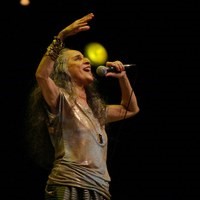Santo Amaro da Purificação (Brasil), 1946
By Adriana Veríssimo
Recognized as one of the great performers of Brazilian popular music, Maria Bethânia Vianna Telles Veloso had sung with her family since childhood but originally aspired to become an actress.
She made her debut as a singer in 1963, in the play Boca de Ouro by Nelson Rodrigues. In the 1960s, she created shows alongside her brother Caetano Veloso, Gal Costa, and Gilberto Gil. In 1965, after attending one of her performances, Nara Leão invited her to replace her in the show Opinião, running in Rio de Janeiro, where Bethânia performed the song “Carcará.” That same year, she recorded her first albums—a single and a record featuring songs by Noel Rosa, Benedito Lacerda, and Caetano.
Bethânia competed in festivals and sang in theaters and nightclubs in Rio de Janeiro and São Paulo, gaining national recognition. In 1978, the album Álibi earned her a third gold record. Until the 1990s, she recorded albums considered intimate. In 1993, she revisited romanticism with songs by Erasmo and Roberto Carlos. In 2001, she recorded the live album Maricotinha ao Vivo, which earned her a gold record for selling 120,000 copies. In 2003, she created her own label, called Quitanda, in partnership with the record company Biscoito Fino, launched with the release of the CD Brasileirinho, featuring songs that addressed themes of religiosity and Brazilian identity.



